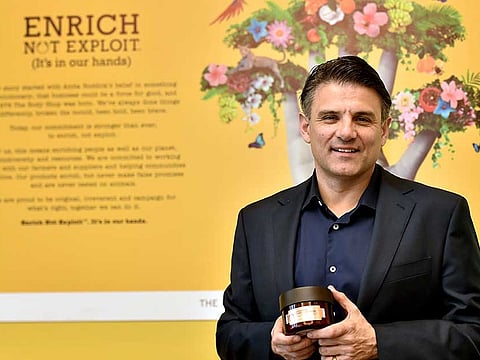New product launches to help The Body Shop grow in the region in 2016
Fragrances and makeup are the company’s best-selling categories in the Middle East

Dubai: Beauty retailer The Body Shop expects growth in sales in the Middle East this year, driven by new products launches in cosmetics and skincare, according to its chairman and chief executive.
The company launched in January a new foundation and plans to roll out a range of natural face masks in the Middle East by the end of this year.
Fragrances and makeup are the company’s best-selling categories in the Middle East, accounting for 30 per cent and 18 per cent of sales respectively, The Body Shop chairman and chief executive Jeremy Schwartz said in an interview in Dubai on Monday.
“We are looking at a growth of 3 per cent in the cosmetics market in the Middle East [in 2016],” Schwartz said.
The company saw ‘double digit’ sales growth in some markets in the Middle East, including Saudi Arabia and Oman, last year, he said. He declined to give data on the company’s performance and projections.
Growth in business in the region last year was driven by sales of both premium and affordable skincare products, he said.
“Many people in the Middle East have money and want to have something more indulgent,” he said.
“What we demonstrated by these premium products is that the customer here is looking for solutions and responding to new ideas,” he said.
The British retailer’s like-for-like sales declined 0.9 per cent last year. Sales reached 967.2 million euros (Dh4 billion).
The Body Shop, founded by Anita Roddick in 1976, was sold to French cosmetics company L’Oreal in 2006. The company has more than 3,000 stores in over 60 countries. The Middle East, where it has more than 300 stores, represents over 12 per cent of its business.
Saudi Arabia is The Body Shop’s largest market in the Gulf Cooperation Council (GCC) — which makes up around 30 per cent of its business in the region — followed by the UAE and Kuwait.
Sign up for the Daily Briefing
Get the latest news and updates straight to your inbox



